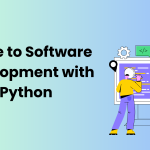With the demands of today’s digital environment, organizations are expected to build interactive and smart applications. The key to developing more engaging apps is to integrate speech and language AI capabilities into applications. Humans understand human language whereas mobile apps and servers exchange information in the form of APIs. That’s where the discrepancy lies since speech-to-text API solutions are crucial in almost all industries.
Now the question arises what is an API? API refers to the Application Programming Interface. It is a pathway through which two or more software or applications communicate with each other. API is a medium to share, transfer or retrieve data between or among organizations.
We can see APIs all around us in the digital landscape. Whether you book a ridesharing app, send the request and receive driver’s information. At the back-end, the information is retrieved from the data server. The API makes it feasible for this data sharing.
An further illustrative example is when a website requires account creation, you may access it using your social media login credentials. Again, this data is being retrieved by API from other services.

If you have to encounter natural language processing (NLP), language translation, sentiment analysis, image recognition or speech recognition – AI has evolved language and speech APIs to a next level. Not to forget that Machine Learning ML has a big role in speech-to-text (STT) and Text-to-Speech (TTS) technologies.
This article entails 6 top-notch language and speech AI APIs that are well-suited for your business solutions. But first we’ll explore TTS and STT technologies that are commonly known as “Read Aloud” technologies.
What is Text-to-Speech (TTS)?
The technique of inputting text and pre-recorded sounds to create synthesized speech is known as text-to-speech, or TTS. To create spoken words, it most frequently employs narrators’ pre-recorded vocal sounds. A text-to-speech API will read aloud whatever characters you enter. While they’re always evolving and getting better, long-standing voices like Apple’s Siri and Amazon’s Alexa are excellent examples.
When using classic text-to-speech, a voice actor records a collection of neutral vocal sounds, which are then saved in a database and linked to a dictionary that has all the possible combinations of inflections that may be used to produce words that make sense.
Some of the key Text-to-Speech (TTS) features are:
1: Multiple language compatibility:
TTS offers multiple language compatibility to users across the globe. Businesses can reach a wider audience regardless of language and dialect differences.
2: Realistic voices with customization:
A variety of voices with different genders, ages, and accents are available on TTS systems. Users may select the voice that most closely matches their interests and tastes.
3: Emotionality:
By adjusting the intonation, emphasis, and tempo, certain text-to-speech AI APIs may convey emotions through voice. Interactive storytelling, video games, and entertainment all gain greatly from this feature.
4: Scalability:
Because TTS APIs are intended to be scalable, handling massive amounts of text is not a problem for them. They are perfect for usage in a wide range of applications, from enterprise-level solutions to mobile ones.
Top Language & Speech AI APIs That Act as a Game-Changer
1: Google Cloud Speech API
Google cloud speech API offers the facility to transcribe words into written text. It uses machine learning to understand and analyze speech data and provides scalable text that closely matches real data.
Notable features:
- Google Cloud offers pretrained models for transcription
- It supports 125 dialects
- It incorporates a noise cancellation feature that improves the quality of audio
- Provides a feature of giving captions to videos using AI-powered tool
Google Cloud Speech API use cases:
- Production of media
- Healthcare documentation
- Educational content
Limitation:
Google cloud efficiency may decrease if you use any specialized vocabulary or technical jargons that were not initially used in the training data. All single queries made to the API utilizing local files are subject to a 10 MB limit. Security and privacy concerns may arise due to the cloud being in the picture. So users should be mindful of transmitting data on the cloud.
Pricing:
A 60-minute transcription is included in the free version. One million bytes of premium voice may be purchased for $16.

2: Speech Recognition (Python Library)
The ability of a machine to listen to spoken words and recognize them is known as speech recognition. After that, you may ask a question or respond using Python’s voice recognition feature to transform spoken words into text. Certain gadgets can even be programmed to react to these uttered phrases. With the use of computer programs that receive information from the microphone, python is a great alternative.
Notable features:
- It offers speech transcription into text in real-time
- It provides audio processing and microphone accessibility
- It leverages easy-to-use formats for identifying speech recognition APIs
Python Library use cases:
- Voice-powered assistants
- Language learning capabilities or apps
- Transcription services
- Accessibility solutions for disabled individuals
Limitation:
Python speech recognition library works only on an active internet connection. It might come across latency issues due to unstable network connection or the response time of the API
3: Speechmatics
Speechmatics offers a platform that leverages automatic speech recognition (ASR) solutions to transcribe speech into text with stunning accuracy.
Key features:
- Supports multiple languages and dialects, making it suitable for global applications prospects
- Offers high-level customization options, enhancing its applicability for various industries and accents
Speechmatics use cases:
- Content creators can use Speechmatics to transcribe podcasts, speeches, lectures and other spoken content
- Additionally, it may be applied to contact center analytics, customer feedback analysis, and market research to extract insights from audio data
Limitation:
Since Speechmatics is an enterprise-grade solution, it requires frequent API calls or real-time transcription which could increase the cost of the solution.
Price:
The cost of Speechmatics usually varies based on usage volume, degree of support, and needed extra features. They provide subscription-based pricing structures that are customized to meet the needs of every unique customer.
4: IBM Watson Natural Language Understanding
IBM Watson Natural Language API, as the name implies, provides a wide range of text analysis features, including entity recognition, sentiment analysis, concept tagging, and emotion analysis. It can analyze unstructured text data and provide valuable insights.
Notable features:
- It offers high-quality speech recognition features in real-time
- It offers easy analysis and monitoring solutions for audio transcriptions
IBM Watson use cases:
- Identify social media posts, customer feedback, and product reviews
- Analyze entities such as people, organizations, locations mentioned in the text
- In order to assist with content summarization and subject identification, Watson NLU is able to extract significant keywords and concepts from text sources
Limitation:
IBM needs complex integration into existing workflows and third-party systems, hence requires intense development efforts
Price:
You can choose to pay for IBM Watson NLU according to the quantity of text data processed or the number of API calls you make. This pricing approach is known as pay-as-you-go. There are many use levels with varying pricing tiers, so you may select the plan that best suits your requirements.
5: AWS Amazon Polly
AWS Amazon Polly is a cloud service to convert text into lifelike speech. It offers 29 languages and 60 voices available in several locales. It can be used to develop apps and products that support inclusivity, engagement and accessibility. Amazon understands homographs, dates, fractions, synonyms, units, currencies etc in the text and translates them into fine quality audio just like a pro.
Notable features:
- A large variety of languages and dialects are offered
- It offers a myriad of 60 voice choices
- It makes use of neural text-to-speech (NTTS) technology, which enhances audio quality
Use cases for Amazon Polly on AWS:
- Games
- eLearning platforms
- Internet of Things (IoT)
Limitation:
Up to 3000 billable characters (6000 total) can be entered in the input text for eLearning platforms, games, and the Internet of Things (IoT). 10 minutes is the maximum duration for the audio stream output (synthesis)
Price:
For the first 12 months following your initial speech request, you can request 5 million characters each month for speech or Speech Marks during the free trial. For every one million characters requested for speech or Speech Marks, the normal voices cost $4.00.
6: Deepgram
Using an API-call, Deepgram is an automatic speech-to-text transcription service that transcribes audio that has been captured or is live-streamed.
Notable features:
- Available on cloud
- Supports multiple languages (approximately 30 dialects) for simple speech-to-text deployment
Use cases for Deepgram:
- Medical transcription and documentation
- Voice data mining
- Call center analytics
Limitation:
When submitting sensitive audio files to Deepgram’s platform, users should think about the privacy and security consequences, just as with any other cloud-based service. It is crucial to guarantee adherence to data protection laws and to put in place suitable security measures.
Price:
Deepgram’s pricing depends on multiple factors such as customization and integration options, usage volume and specific features.
Wrapping Up
Speech and language AI APIs are the need of the modern digital world. If you want a conformable and inclusive world, where visually impaired individuals can equally engage with apps, then AI-powered APIs can make processes much smoother, faster and with less hiccups. The additional benefit of AI APIs is automating tasks and improving productivity. Lo and behold, the world awaits a future of innovation, automation and accuracy.
Stackup Solutions offers accurate and flawless AI APIs to help you get started with your project. Hit us up and see if we can be a good partner in delivering best-in-class software solutions to your business. Contact us NOW!




